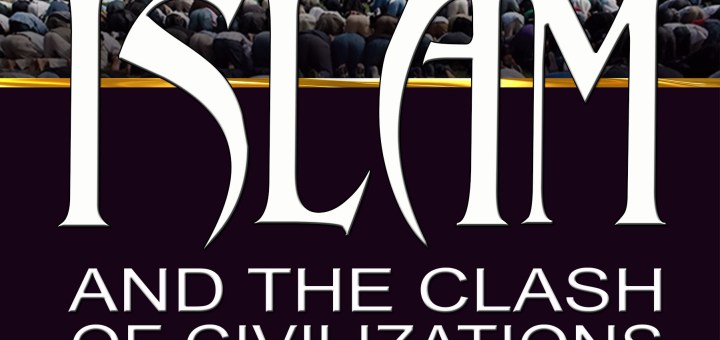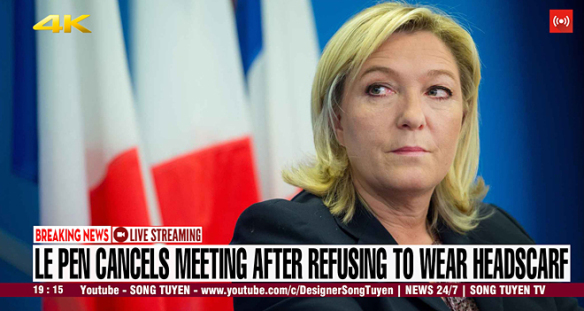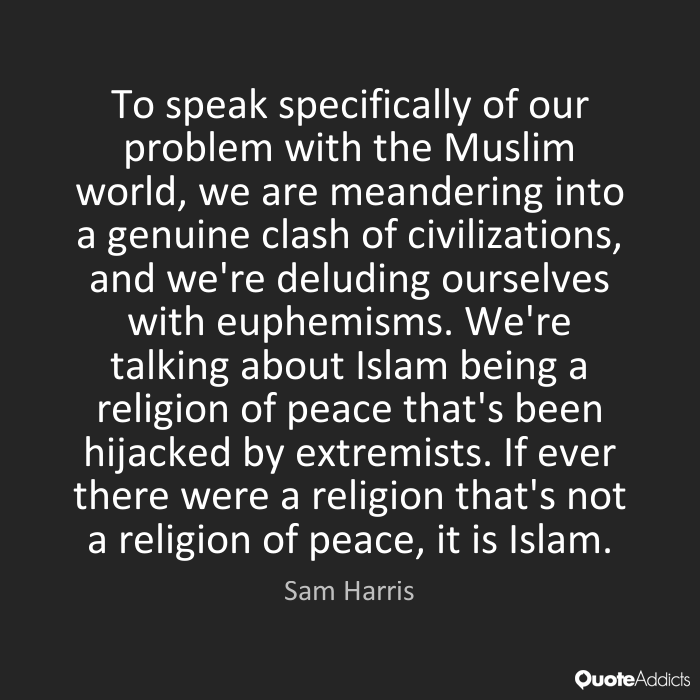By David Montaigne, author of Nostradamus and the Islamic Invasion of Europe
As the description at Wikipedia says: The Clash of Civilizations (COC) is a hypothesis that people’s cultural and religious identities will be the primary source of conflict in the post-Cold War world. It was proposed by political scientist Samuel P. Huntington in a 1992 lecture at the American Enterprise Institute, which was then developed in a 1993 Foreign Affairs article titled “The Clash of Civilizations?”

“Huntington also argues that civilizational conflicts are ‘particularly prevalent between Muslims and non-Muslims.'” 25 years later, this does seem to be a dominant problem in international relations. But it was a different author that prompted me to write up this blog post: I found a great article by William Kirkpatrick at the counterjihadreport blog here. They found: “On the Civilizational Struggle With Islam” (by William Kirkpatrick) at Crisis Magazine
“In February, female members of an official Swedish delegation to Iran donned headscarves and long coats so as not to offend their Iranian counterparts. At about the same time, Marine Le Pen, the leader of France’s National Front Party, cancelled a meeting with Lebanon’s Grand Mufti after he insisted that she wear a headscarf. “You can pass on my respects to the Grand Mufti,” said Le Pen, “but I will not cover myself up.”

The contrast neatly captures two different responses to the ongoing Islamization of Europe. Le Pen represents resistance, and the Swedish delegation represents appeasement. So far, the party of appeasement holds the upper hand. Shortly after her gesture of defiance, the European Parliament voted to lift Le Pen’s immunity from prosecution (as a Member of Parliament) for tweeting images of Islamic State violence. Like the Swedish delegates’ gesture of obeisance, this too is an act of appeasement. It signals to the Muslim world that Europeans will take it upon themselves to punish those who criticize Islam.
There may be cases where appeasement works to placate an enemy, but it never seems to work against an implacable foe. In May, 1938, while competing in Berlin, the English national football team gave the Nazi salute when the German national anthem was played. They did this, reluctantly, on orders from their own foreign office. It was one of numerous futile gestures of appeasement offered up to Hitler.

Some historians have suggested that Hitler could have been stopped if the Allied Powers had confronted him earlier before he had time to build up the Wehrmacht. That’s probably true. The best time to fight a war is while you still have a good chance of winning it. This applies also to the ideological struggle now going on between the West and Islam. Of course, “struggle” might not be the best way to describe a conflict in which only one side is fighting. Indeed, Western authorities often join in Islam’s war against the West. By passing laws against “Islamophobia” (Canada) and by prosecuting critics of Islam (as in Europe), the West is strengthening the hand of its foe.
Instead of appeasement, what is needed is an ideological counter-attack. And the best time to launch it is now—now while it is still possible to make one’s case without being fined or jailed. Now is the right time from another perspective, as well. The sheer volume of Islamic violence is difficult to ignore. As a result, more and more people now realize that criticism and challenge of Islam is fully justified. They realize that it should be Muslims who are put on the defensive, not the so-called “Islamophobes.”
Imagine if Catholics were committing violence on the same scale as Muslims, and doing it in the name of Jesus. Would the Catholic Church be afforded the kind of kid-glove treatment now given to Islam? Would Catholic clergy be let off the hook for the crimes of tens of thousands of Catholics who cited Catholicism as their motive? Not likely. The Catholic Church would be put on the defensive—and rightly so if, indeed, the Church had a well-developed doctrine of jihad as does Islam.
In a sane society, Islam and its representatives would be put on the defensive, not critics of Islam. Instead of exonerating Islam of responsibility for Islamic terror, non-Muslims should pressure Muslims to justify the tenets of Islam that call for violence. Islamic authorities should be pushed back on their heels and kept there.

Just as non-Muslims can no longer deny the immensity of Islamic violence, neither can Muslims. Yet, absent any outside pressure, they can ignore it. This is a good time for Muslims to do some soul-searching about the beliefs that, in the words of Egyptian president El-Sisi, “make the entire umma [Muslim community] a source of concern, danger, killing and destruction for the whole world.” But if no one (with a few exceptions such as El-Sisi) asks them to question themselves, whatever doubts Muslims may have about their faith will be brushed aside. If Western leaders persist in lauding Islam as a great religion, it will be taken as confirmation that Islam is indeed the supreme religion that the imams say it is.
Muslims won’t attempt to reform Islam unless they believe there is something wrong with it. If we want to see reform, we need to drop the “great faith” pretense, and confront Muslims with the troubling realities of their beliefs. Now is the time to put Islam on the defensive because the window of opportunity for doing so will soon close. It is already dangerous to question or challenge the Islamic belief system. The time is coming when it will be supremely dangerous to do so.
Right now, the West is worried about the danger of provoking Islam. But there is a greater danger. By refusing to confront and challenge Islam’s ideology, we allow an already confident Islam to grow more confident and stronger—two characteristics that make it all the more attractive to lukewarm Muslims and potential convents. The West’s walking-on-eggshells strategy is aimed at preventing a confrontation with Islam, but it may only serve to delay a confrontation to a point in time when the West is too weak to stand up to Islam.
The West will continue to have the military edge for a good time to come, but possessing weapons is one thing, and possessing the will to use them is another thing altogether. [Think back to Britain and France, the two superpowers of the late 1930s – both of which refused to take proactive defensive action against Nazi Germany when they easily could have. A few years later it was too late.] The West is strong militarily, but weak ideologically. It lacks civilizational confidence. It is not sure if it has anything worth defending. While Islamic countries have been busy raising a generation of devout warriors, the West has raised a generation of social justice warriors who are convinced that their own civilization deserves to be eliminated….”
Read far more at the full original article
William Kilpatrick taught for many years at Boston College. He is the author of several books about cultural and religious issues, including Why Johnny Can’t Tell Right From Wrong; and Christianity, Islam and Atheism: The Struggle for the Soul of the West and The Politically Incorrect Guide to Jihad.
The “lack of civilizational confidence” is particularly weak in Europe, especially in once great nations like Germany and France whose leaders and voters seem to act like “their own civilization deserves to be eliminated.” The French prophet Nostradamus repeatedly warned of an Islamic Invasion of Europe coming in the early 21st century, and he also said that France would be invaded due to neglect and negligence. You can imagine what could happen if a global economic collapse leads some nations to try to solve their problems by starting WWIII. I don’t have to imagine: Nostradamus clearly described the outcome almost 500 years ago. Check out:
Nostradamus and the Islamic Invasion of Europe

